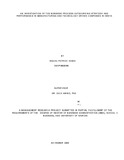| dc.description.abstract | As the world goes through the current economic recession that has impacted both developed and
developing countries, focus will shift to those strategies that can help companies remain lean and
quick to overcome the effects of the economic decline and the subsequent decline in markets.
Business process outsourcing is one of the strategies that would help firms remain focussed in their
core activities and consequently remain competitive in the face of the global financial squeeze.
Outsourcing is becoming a significant strategic issue. According to Casale (2000), outsourcing has
become a standard practice across all industries. Further, it has evolved from being a 'controversial
practice to a mandatory business strategy for companies to compete successfully in today's fast-paced,
e-commerce-enabled market environment' (Casale, 2000). Casale asserts that outsourcing
is no longer a tool only for cost-control, but rather has become a strategic tool for innovation, global
expansion, and a source of competitive advantage. This study evaluated the effect of Business
Process Outsourcing (BPO) as a strategy on company performance. The study used the descriptive
research method. Structured questionnaires were employed to measure researcher- set variables
related to business process outsourcing and performance in Kenya's manufacturing and technology
driven firms. The questionnaire also had sections for the respondents to record what the researcher
could not have identified as a measurable variable. Several statistical analyses were performed on
the data collected form the field. Descriptive statistics..were used to analyze the distribution of any
category and numerical responses to generate frequencies, percentages, graphs and tables. Data
from open ended questions were transcribed, reconstructed and analysed using narratives. The
study findings revealed that companies that have outsourced their non -core activities have realised
improved performance, better quality management and competitive advantage among other benefits.
Some of the respondent companies have not outsourced non core activities as they believe they
have adequate in-house capacity. | en |

